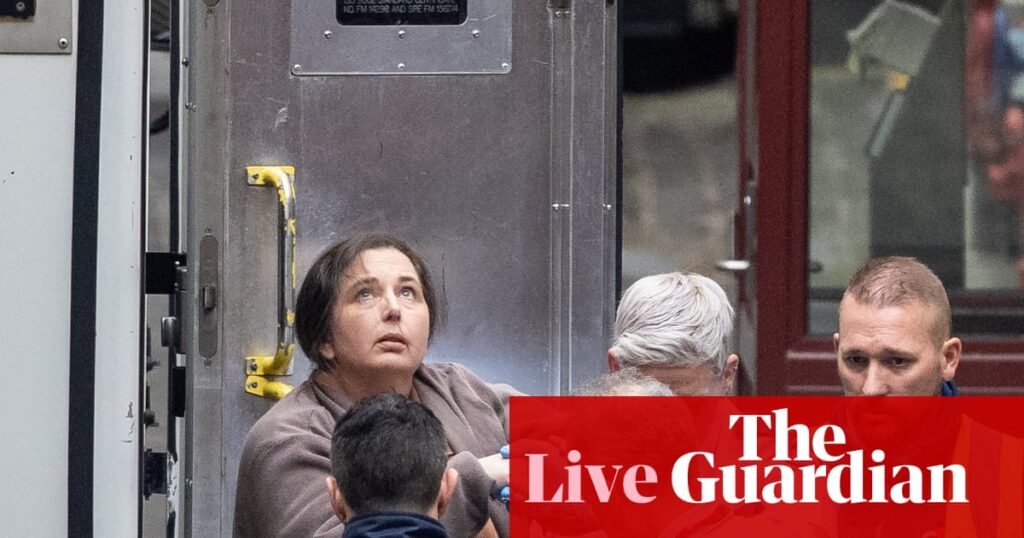Defence will not argue against life sentence for ‘grave’ offences
Mandy says the defence will not argue against a life sentence for the “grave” offences.
“The ultimate issue, the dispute between parties, is whether or not a non-parole period should be fixed,” he says.
Mandy says his client facing a minimum non-parole period of 30 years means she would be 80 before she becomes eligible to apply for parole.
He says Patterson being held in isolation is a relevant sentencing factor.
“Ms Patterson will likely be held in those conditions for the foreseeable future,” he says.
Mandy says Patterson will always be at risk from other prisoners, meaning isolation will be required to manage this.
Mandy says these conditions make the “burden of imprisonment” much greater for Patterson than other prisoners.
Key events
Judge asks about alleged Asperger syndrome
Justice Christopher Beale asks Mandy about his reference to Patterson having Asperger syndrome in his written submission.
Mandy says this is Patterson’s claim in the brief of evidence and was also mentioned by others in their depositions.
He tells the court Simon Patterson said that he believed Patterson had anxiety and high-functioning autism.
Mandy says:
“She does find it difficult because of that condition. Because she finds it difficult to cope with changes in routine,” he says.
Beale says it doesn’t sound like there is much change in routine for Patterson.
But Mandy says there are “minute by minute” changes, such as prisoners yelling in nearby cells, which is “never palatable”.
Defence will not argue against life sentence for ‘grave’ offences
Mandy says the defence will not argue against a life sentence for the “grave” offences.
“The ultimate issue, the dispute between parties, is whether or not a non-parole period should be fixed,” he says.
Mandy says his client facing a minimum non-parole period of 30 years means she would be 80 before she becomes eligible to apply for parole.
He says Patterson being held in isolation is a relevant sentencing factor.
“Ms Patterson will likely be held in those conditions for the foreseeable future,” he says.
Mandy says Patterson will always be at risk from other prisoners, meaning isolation will be required to manage this.
Mandy says these conditions make the “burden of imprisonment” much greater for Patterson than other prisoners.
Mandy disputes claim Patterson has not seen prison chaplain
Mandy disputes Hosking’s evidence that his client has not used the prison’s chaplaincy service.
Hosking says she had been informed about Patterson’s lack of engagement with the chaplaincy service by prison officers but had not seen records about this.
Mandy says Patterson has used the chaplaincy service and seen the chaplain on a number of occasions.
Hosking says she cannot refute this.
Patterson has never spoken to another prisoner, Mandy says
Mandy says Patterson is not able to use the courtyard if another prisoner is using it due to her restricted conditions.
Hosking says Patterson has approval to have contact to one other prisoner.
But Mandy says she has never spoken to this prisoner.
“I can’t deny that,” Hosking says.
She says this could be due to the other prisoner not wanting to speak to Patterson.
Under questioning by Mandy, Hosking confirms the other prisoner is serving a sentence for terrorism and has attacked other prisoners.
Patterson spends 22 hours a day in cell and is separated from other prisoners
Patterson’s defence lawyer, Colin Mandy SC, is questioning Hosking.
Responding to Mandy, Hosking says the maximum time period that prisoners should remain in separation is 15 days according to UN guidelines.
Hosking says Patterson has been alone, segregated from other prisoners, in the restricted Gordon unit for 14 months.
Mandy says this is about 400 days. Hosking says she agrees with this.
Mandy says Patterson says she has only met with her prison case worker a “handful” of times.
He says Patterson spends about 22 hours a day in her cell due to lockdowns at the prison. Hosking agrees.
She says there is a small courtyard adjacent to Patterson’s cell that she had access to for up to an hour a day.
Library access limited
Hosking says due to staff shortages, there have been more lockdowns at the Dame Phyllis Frost Centre since the middle of 2024.
Consequently, Patterson’s access to some areas of the prison including the library have been limited, Hosking says.
Hiring at the prison was paused due to Covid and lower levels of prisoners, the court hears.
Hosking says she expects staff shortages to ease later in the year due to a current recruitment drive.
‘A keen crocheter’ who has not used chaplaincy services
Under questioning by Warren, Hosking says Patterson has not used the chaplaincy services available to her at the prison.
Hosking tells the court about Patterson’s cell:
“I understand she’s a keen crocheter. She has a lot of wool and crochet equipment within there.”
“She has her computer which she’s had for some time.”
Patterson also has crocheted blankets she has made herself, Hosking says.
“She also has a hair straightener and a fan,” she says.
Hosking says after Patterson is sentenced she will have access to the prison’s education services.
Patterson’s life behind bars
Within six weeks of arriving at the Dame Phyllis Frost Centre – a maximum security women’s prison in Victoria – Patterson was moved from the Gordon unit (a restricted unit) to the Murray unit.
Hosking says the Murray unit is for prisoners requiring more supervision or protection. In March 2024, Patterson returned to the Gordon unit due to safety concerns. She later returned to the Murray unit before being transferred to the Gordon unit in June 2024.
Hosking says Patterson has engaged with forensic intervention services – rehabilitation and treatment programs within the prison – for a “period of time”.
“She is still able to access that. She has most recently … refused to engage,” she says.
The court hears Hosking has made an affidavit about Patterson’s custody conditions.
Prosecutor Jane Warren is questioning Hosking.
Hosking says when Patterson was taken into custody in 2023 she was assigned a “major offender” status due to a high volume of media attention.
Jenny Hosking, the assistant commissioner for the sentence management division at Corrections Victoria is appearing via video link.
Who has the court heard from so far?
Earlier, we heard from family members affected by the murder of Don and Gail Patterson and Heather Wilkinson. The court also heard from Ian Wilkinson, the sole surviving lunch guest.
The Victorian supreme court heard seven victim impact statements, out of a total of 28, from:
Ian Wilkinson
Ruth Dubois, Heather and Ian’s daughter
Lynette Young, Heather and Gail’s sister
Martha Patterson, Don’s mother
Colin Patterson, Don’s brother
Tim Patterson, Don’s nephew
Simon Patterson, Erin’s estranged husband
The remaining statements will not be read in court.
Lynette’s Young statement was read by prosecutor Nanette Rogers SC.
Simon Patterson, Erin’s estranged husband, had his victim impact statement read in court by Naomi Gleadow, his cousin. Gleadow also read statements from Martha, Colin and Tim.
Erin Patterson’s plea hearing has resumed in the Victorian supreme court.

Nino Bucci
Ian Wilkinson says he forgives Erin Patterson for trying to murder him but cannot offer her forgiveness for killing three other people with poisoned beef wellingtons, a Victorian court has heard.
You can read more about the victim impact statement Wilkinson delivered this morning here:
Court adjourns until 2.15pm
There are a total of 28 victim impact statements, the court hears. The remainder will not be read in court.
Justice Christopher Beale says after the break the court will hear from a Department of Corrections employee about Erin Patterson’s custody conditions.
The hearing is adjourned until 2.15pm.
Simon Patterson describes media attention as ‘dehumanising’
Simon’s statement also calls out the “deplorable” actions of some legacy media outlets.
He details having his home ambushed by the media and says his family have become fearful of strangers. He says:
The children and I have been filmed in cafes and in the street.
He describes the media attention as “dehumanising”. He says:
I doubt I’ll get used to being treated in that way.
Simon Patterson says his children ‘robbed of hope’ in victim statement
The final victim impact statement is from Simon Patterson, which Gleadow reads out on his behalf.
He says he misses his parents and aunt “more than words can express”.
Simon says his two children have been left without grandparents and “robbed of hope”.
He says:
Like all of us, they face the daunting challenge of trying to comprehend what [Erin] has done.
The grim reality is they live in an irreparably broken home with a solo parent when almost everybody knows their mother murdered their grandparents.”
He says these are difficult hurdles to overcome.
Despite this both children are incredibly strong, loving, intelligent … with much help they are overcoming the hurdles.
‘They deserve better than this’: Don and Gail Patterson’s nephew gives statement
Naomi Gleadow also reads a statement from Tim Patterson, the nephew of Don and Gail, to the court.
He says after their deaths he wrote an entry in his diary:
I wrote in my diary: ‘Why did God decide to end such amazing lives in such a horrific manner? They deserve better than this.’
Tim says he now finds it difficult to “comprehend this world”. He says:
I still can’t believe that Don and Gail are gone.
Tim says sometimes it seems as though “they just haven’t seen each other in a while”, as if “they’re still there in Korumburra, sitting by the fire in their cosy living room”.
Don Patterson’s younger brother says murders severed ‘core relationships’
The court hears from Colin Patterson, the younger brother of Don, whose victim impact statement is read by Gleadow.
He says the “core relationships” in his life “have been severed”.
He describes his older brother Don as a “powerful influence” on him.
Court hears statement from Don Patterson’s mother
The victim impact statement of Martha Patterson, Don’s mother, is read by Naomi Gleadow.
Martha’s statement says the whole family is broken and she feels “broken-hearted”.
She says: “May God help our family to heal after this tragedy.”


